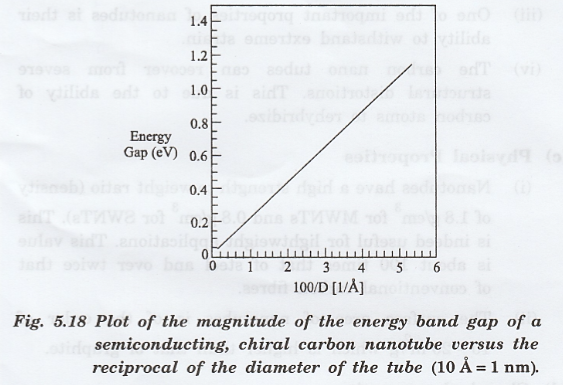Physics for Electronics Engineering: Unit V: Nano Devices
Properties of Carbon Nanotubes (CNTs)
Carbon nanotubes are metallic or semiconducting depending on the diameter and chirality (ie., how the tubes are rolled).
PROPERTIES OF CNTS
(a) Electrical Properties
i.
Carbon nanotubes are metallic or semiconducting depending on the diameter and chirality
(ie., how the tubes are rolled).
ii. The energy gap of semiconducting chiral carbon nanotubes is inversely proportional to the diameter of the tube as shown in fig 5.18.

The
energy bandgap decreases with increase of diameter of the CNTs.
iii.
The energy gap also varies along the tube axis and reaches a minimum value at the
tube ends. This is due to the presence of localized defects at the ends due to
the extra energy states.
iv.
In SWNTs, conduction occurs through discrete electronic states that are
coherent between the electrical contacts (hundreds of nanometers).
This
means that nanotubes can be treated as quantum wires atleast at very low temperatures.
(b) Mechanical Properties
i.
The strength of the carbon-carbon bond is very high therefore any structure
based on aligned carbon-carbon bonds will ultimately have high strength.
ii.
Young's modulus of CNT is about 1.8 TPa (1012 Pa about 10 times
larger than that of steel).
Nanotubes have therefore high ultimate tensile-strength
iii.
One of the important properties of nanotubes is their ability to withstand extreme
strain.
iv.
The carbon nano tubes can recover from severe structural distortions. This is
due to the ability of carbon atoms to rehybridize.
(c) Physical Properties
i.
Nanotubes have a high strength-to-weight ratio (density of 1.8 g/cm3
for MWNTs and 0.8 g/cm3 for SWNTs). This is indeed useful for
lightweight applications. This value is about 100 times that of steel and over
twice that of conventional carbon fibres.
ii.
The surface area of nanotubes is of the order of 10 - 20 m2/g which is higher than
that of graphite.
(d) Chemical properties
Nanotubes
are highly resistant to any chemical reaction. It is difficult to oxidize them
and the onset of oxidation in nanotubes is 100°C higher than that of carbon
fibres.
As
a result, temperature is not a limitation in practical application of
nanotubes.
(e) Thermal properties
Nanotubes
have a high thermal conductivity and the value increases with decrease in diameter.
Physics for Electronics Engineering: Unit V: Nano Devices : Tag: : - Properties of Carbon Nanotubes (CNTs)
Related Topics
Related Subjects
Physics for Electronics Engineering
PH3254 - Physics II - 2nd Semester - ECE Department - 2021 Regulation | 2nd Semester ECE Dept 2021 Regulation
